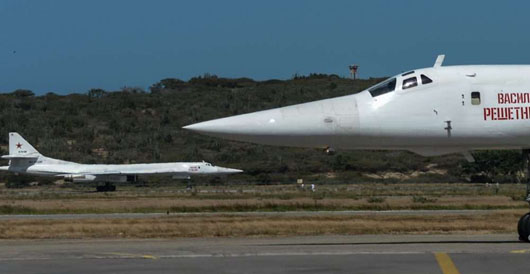CELEBRATING 20 YEARS OF EXCELLENCE: Countdown: Top stories of 2018
by WorldTribune Staff, December 27, 2018
In one of the largest Russian military deployments to the region since the Cuban Missile Crisis in 1962, Moscow has sent supersonic bombers to one of Venezuela’s islands in the Caribbean Sea.
Russian military Col. Eduard Rodyukov said the move by President Vladimir Putin was in response to U.S. President Donald Trump’s threat to scrap nuclear treaties.

The Tu-160 bombers – nicknamed White Swans – can fly over 7,500 miles without refueling and are capable of carrying short-range nuclear missiles.
U.S. Secretary of State Mike Pompeo blasted the move on Twitter: “Russia’s government has sent bombers halfway around the world to Venezuela. The Russian and Venezuelan people should see this for what it is: two corrupt governments squandering public funds, and squelching liberty and freedom while their people suffer.”
Venezuela’s socialist President Nicolas Maduro, looking for hard cash during an economic and humanitarian crisis in his country, accepted Moscow’s proposal to use the Caribbean island, according to Russian newspaper Nezavisimaya Gazeta.
Under Venezuelan law, military bases cannot be established by foreign nations in the country, but a temporary deployment of warplanes is possible.
Russian military analyst Col. Shamil Gareyev said establishing a long-term presence in Venezuela was an economically sensible decision if more joint exercises are to take place.
“Our strategic bombers will not only not have to return to Russia every time, but also won’t perform aerial refueling while on a patrol mission in the Americas,” Gareyev said.
In a Dec. 4 announcement, the Trump administration gave Russia 60 days to comply with the Intermediate-Range Nuclear Forces (INF) Treaty or the U.S. would withdraw.
Russia, Pompeo said, has developed “multiple battalions of the SSC-8 missiles,” a move that falls outside of the treaty. “Its range makes it a direct menace to Europe,” he said after a meeting with his NATO counterparts.
“Russia’s violation of the INF Treaty erodes the foundations of effective arms control and undermines Allied security. This is part of Russia’s broader pattern of behavior that is intended to weaken the overall Euro-Atlantic security architecture,” wrote NATO foreign ministers in a joint statement. “We call on Russia to return urgently to full and verifiable compliance. It is now up to Russia to preserve the INF Treaty.”
Check Out Geostrategy-Direct __________ Jump Start the U.S. Media
